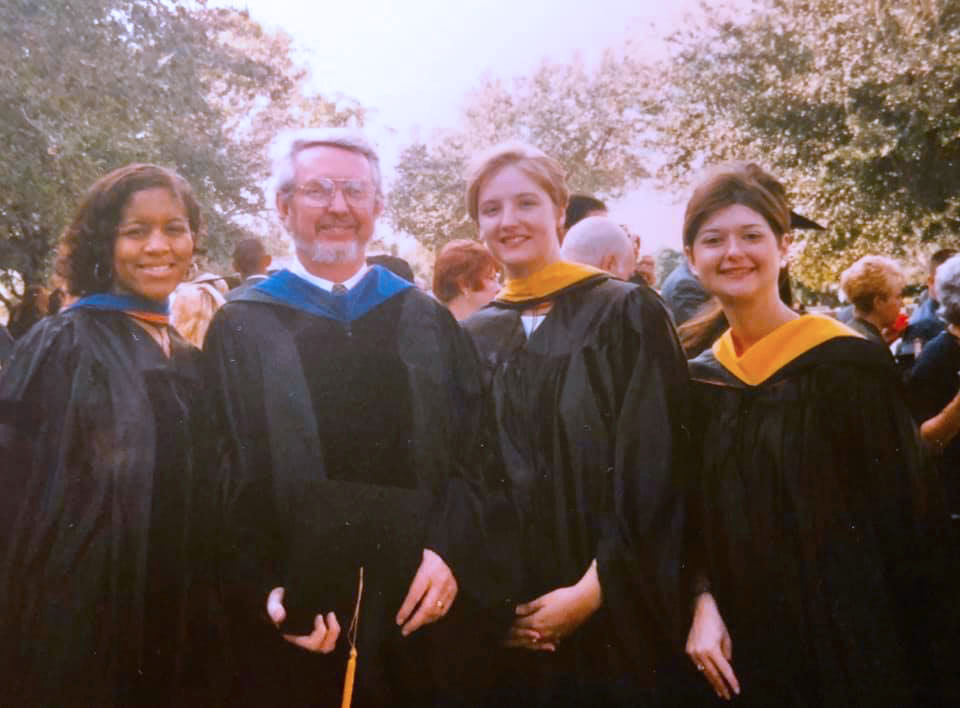When Rachel Avchen, ’99, decided to attend graduate school at the University of Miami, finding a safe and affordable place to live was a major concern. Looking back, she fondly remembers the day Psychology Professor Keith Scott took her on a tour of Coral Gables. With his help, she found an apartment near campus and situated herself before embarking on an academic path in psychology and 20-year career with the U.S. Centers for Disease Control and Prevention (CDC).
Sadly, Professor Scott passed away on February 29, in Dacula, GA., at 85, after over 30 years in the College of Arts and Sciences Psychology Department, where he cofounded the Linda Ray Center. Today, the center continues to meet the needs of some of South Florida’s highest-risk babies and toddlers by bringing research and early intervention together in innovative, collaborative ways.
“Keith was more than just a professor and academic advisor to me and so many others,” recalls Avchen. “Without his influence, I would not be where I am today. Even from our first interactions, he was such a kind person, as well as an amazing professor and mentor.”
Today, Avchen serves as chief of the CDC’s Evaluation and Analysis Branch in the Division of State and Local Readiness and the Center for Preparedness and Response, which provides analysis and evaluation services to support state and local decision making related to COVID-19. “Our division provides funds to 50 states, eight U.S. territories and freely associated states (including Puerto Rico), and four local health departments in the U.S.,” she said.
After earning her undergraduate degree at Emory University, Avchen took a year off and applied for a job at the UM School of Education and Human Development. It was during this time that she met Scott, who inspired her to enroll in graduate school and eventually earn a Ph.D. in applied developmental psychology in 1999.
“I remember after graduation that one of my gifts to him was to help clean up his office,” Avchen recalled. “He had stacks of papers and books everywhere. We used to joke that he could hide behind some of those stacks—they went from the floor to almost the ceiling. In hindsight, while Keith appeared grateful, I always wondered if he could locate an article as fast as he had before I helped him clean up those piles!”
After graduating from UM and encouraged by Scott, Avchen accepted a two-year training position with the CDC’s Epidemic Intelligence Service (EIS) in Atlanta, where she was assigned to the National Center on Birth Defects and Developmental Disabilities. During this time, she promoted safer, healthier practices associated with autism, intellectual disability, prematurity, and other neurological disorders.
She was also deployed to New York City to support a West Nile virus study and later, following the September 11th attacks on the World Trade Center and Pentagon, investigate the threat of bioterrorism on U.S. soil. After the EIS program, Avchen served as the CDC’s principle investigator on a study evaluating the most effective methods to identify and diagnose children nationally for Autism Spectrum Disorder.
Almost ten years later, she came full circle and returned to the EIS program where, as associate director of epidemiology, she supervised a team of physicians, veterinarians, scientists, and nurses. In 2014, during the Ebola outbreak in West Africa, Avchen oversaw the nation’s surveillance efforts for people entering the U.S. from countries with widespread Ebola transmission, primarily Guinea, Liberia, and Sierra Leone. The goal was to monitor passenger traffic and ensure Ebola did not migrate to the U.S.
“I can say with absolute confidence that Keith’s mentorship and advice, his understanding and interest in epidemiology, paved the path and helped create the road that led to my 20-year career at the CDC,” said Avchen. “At the heart of it all I’m still a psychologist, and with every step I’ve taken in my career at the CDC, it is in some way connected to what I learned from Keith. I am forever grateful for his friendship and mentorship.”

